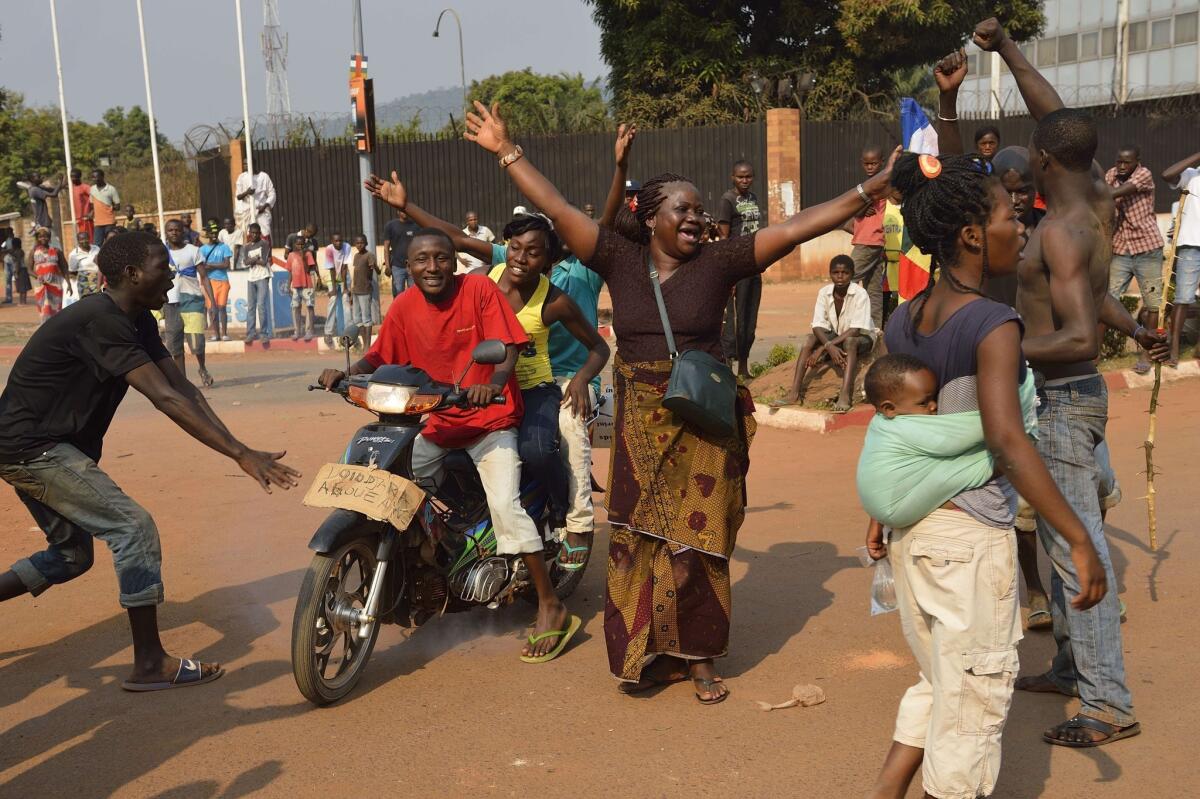Central African Republic president and prime minister resign

JOHANNESBURG, South Africa – The Central African Republic’s interim president, Michel Djotodia, agreed to resign Friday under regional pressure after failing to halt the brutal sectarian violence that has devastated the country, officials announced.
Djotodia, the Muslim Seleka rebel alliance leader who seized power last March in a coup, and interim prime minister, Nicolas Tiengaye, were stepping down, officials said at a special security summit in Chad convened by the Economic Community of Central African States.
Thousands of people took to the streets of the Central African Republic’s capital, Bangui, in jubilant celebration of the news, many of them displaced civilians hoping to return home.
Since the rebels ousted Christian-backed President Francois Bozize, nearly a million people have been forced to flee their homes. More than 1,000 people have been killed in the last month alone, in fighting between Christian and Muslim militias, according to human rights officials.
Djotodia, the first Muslim to lead the majority Christian nation, officially disbanded his rebel group, but rogue forces have continued to rape, kill and loot.
In response to attacks, Christians have formed revenge militias, known as the anti-balaka, or anti-machete, fighters, unleashing a cycle of escalating violence between Christians and Muslims and sparking fears the country could descend into genocide.
France has deployed 1,600 troops in an effort to help stabilize the Central African Republic, and the African Union now has 4,000 regional peacekeepers in the country.
The summit Friday was hosted by Chadian President Idriss Deby Itno amid concerns of the unrest spreading beyond the Central African Republic’s borders. Legislators from the Central African Republic participated in the talks.
The country is now in the hands of a national transitional council led by parliament leader Alexandre Ferdinand Nguendet that is expected within 15 days to choose an interim president to replace Djotodia.
The U.S. State Department called for the Central African Republic to move swiftly in filling the power vacuum and to hold elections no later than February 2015.
“We urge CAR’s national transition council to now conduct a transparent, inclusive process as they deliberate on the selection of the new transitional president,” State Department spokeswoman Jen Psaki told reporters in Washington.
The human rights group Amnesty International called for increased protection for the people of the Central African Republic.
“Today’s resignation by Djotodia could easily trigger revenge attacks by the anti-balaka Christian militias against the Muslim community,” said Joanne Mariner, a senior crisis response advisor. “The Muslim ex-Seleka forces are also heavily armed, creating a real risk of the violence escalating even further. The safety and protection of civilians have to be paramount.”
Renee Lambert, Catholic Relief Services country manager in the Central African Republic, said she hoped that changes in the leadership would result in less suffering from the violence.
“Every day we see its devastating impact – people who have lost everything, children who are traumatized, families that have been torn apart, and a slow and heartbreaking destruction of the country’s infrastructure and social fabric,” Lambert said. “No one has remained untouched by this tragedy.”
Conway-Smith is a special correspondent.
More to Read
Sign up for Essential California
The most important California stories and recommendations in your inbox every morning.
You may occasionally receive promotional content from the Los Angeles Times.










